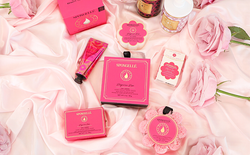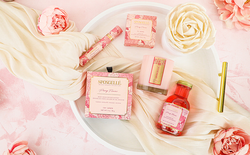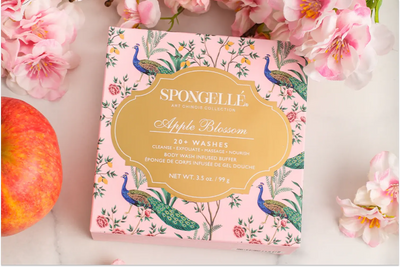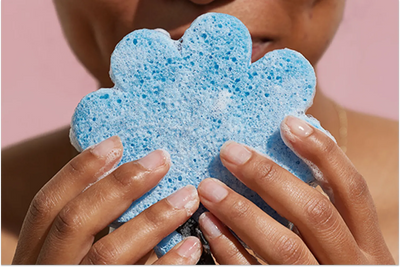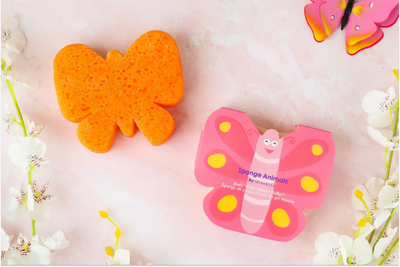It is a common belief that as long as you use moisturizer your skin won’t become dry. Did you know you can be using a moisturizer and still have dry skin? Not all products that claim to have moisturizing benefits actually do. There are many reasons that your skin can still feel parched even while using moisturizer. Thankfully, Spongellé has all the tips and tricks you need for keeping your skin hydrated and glowing from head to toe!
Reasons for Dry Skin
One of the reasons you have dry skin could be the temperature fluctuation throughout the year. Having the same skincare routine throughout the year may not be beneficial. When there is a lack of moisture in the air, it can result in an additional loss of moisture in your skin as well. Your skin is the first line of protection for your entire body. Your skin thrives when it is properly taken care of, and sometimes that means changing your skincare routine with the seasons.
Skin is made up of an inner layer called the dermis and an outer layer called the epidermis. Your body is constantly creating cells in the bottom layer of your skin that will eventually move up and replace the cells on the top layer. As we age, this action slows down. In order to assist our bodies in the process of cell turnover, exfoliation is a great tool to remove dead skin cells.
There isn’t always one particular thing that causes the skin to become dry. Here are a few more reasons you could be experiencing dry skin:
Not Drinking Enough Water
Your water intake directly impacts your skin's ability to retain moisture. Drinking more water can help your skin have the hydration it needs to aid in moisturizing your skin from the inside out.
You’re Using Too Much Cleanser
Using too mer can strip your skin of moisture and much-needed friendly bacteria that are essential to your skin's health. Your skin's microbiome is affected by cleaning it too much or with products that may not be the best for your skin. Try a gentle cleanser and moisturizer for your whole body.
Improper Exfoliation
A lack of proper exfoliation can cause a pile-up of dead skin cells on the surface of your skin. Any moisturizer you place on your skin will not have the opportunity to even do its job, if it is sitting on a layer of dead skin.
You’re Using the Wrong Moisturizer
Using the wrong moisturizer can also be the c Identifying your skin ulprit.type and what products work best on it can play a crucial role in making sure your skin doesn’t become overly dry.
How to Prevent Dry Skin
The prevention of dry skin can seem pretty straightforward. Just slap some moisturizer on your skin and you are good to go, right? Sometimes it can be that straightforward and other times you may need a little extra help with hydrating and taking care of your skin. Your moisturizer should be an important layer of protection for your body and your facial skin.
There are three ingredients that most moisturizers are known to contain:
- Products that contain water, oil, and an emulsifier are called emollients. These types of ingredients are known to assist in the softening of the skin.
- An occlusive to help keep the moisture from escaping.
- A humectant, which is in charge of attracting moisture to the skin.
In general, moisturizers contain these ingredients to make sure that every ounce of moisture available to your skin is attracted to it and locked in place. With a moisturizer, you are usually looking for it to improve your skin texture as well as making sure your skin is completely hydrated.
Tips to Ensure Your Skin Gets the Moisture It Needs
There are seditional ways to make sure you’re helping to ensure your skin is locked and loaded with much-needed moisture. Here are some tips:
- Check your wardrobe: There are several fabrics that are known to be skin irritants such as acrylic and wool. If you have dry skin, it might be in your best interest to eliminate clothing that is made with these types of fabrics.
- Utilize a cool pack or cloth to soothe spots that become itchy: Most of the time application of additional moisturizer can assist with itchiness experienced with dry skin but on the occasion that it doesn’t, try not to scratch.
- Treat your skin gently: Instead of scrubbing when washing or drying your skin, be sure to wash gently and also pat your skin while drying.
- Avoid fragrances: Steer clear of laundry products and skincare products loaded with harsh fragrances or chemicals.
- Use a humidifier: The use of a humidifier can also increase the moisture in the air around you and therefore increase the moisture available to parched skin.
What if Dry Skin Persists?
If you have tried every remedy under the sun and your dry skin still seems to persist, it may be time to seek out a dermatologist to discover the root cause of the issue. A dermatologist is a physician who specializes in the care of your skin. Here are a couple of questions that may be helpful to ask the dermatologist:
- Is there a skincare routine or treatments you recommend?
- What is my skin type?
- Is there a possible underlying cause of my dry skin?
There are also questions your doctor may have for you. You should be prepared before your appointment with the answers to help the doctor come up with a treatment plan. Here are six questions they may need to know the answer to:
- Which moisturizer are you using and how long have you been using the product?
- What shampoo and soap do you use? What temperature water do you use and how often are you bathing or showering?
- What medications are you taking?
- How long have you had your symptoms?
- Are you experiencing any other problems or symptoms besides dry skin?
- Is there anything that you have noticed that makes the dry skin worse or better?
As you go through the list you may identify that you actually just switched laundry detergent or softener and realize you noticed the skin change directly after. Similarly, it could be that you just started a new medication and the dry skin began right after. Sometimes all it takes is a little investigation on your part and you can quickly realize that your symptoms are stemming from a very solvable problem.
Summary
Our skin does some seriously hard work! It protects us even when we don’t do a great job protecting it. Taking proper care of your skin is something that should likely be taught at a young age. As we age we can quickly recall all the times we may not have put sunscreen on or skipped out on moisturizing.
Taking care of our skin and bodies will only benefit us in the long run. Here are some tips to help you keep your skin healthy for a long time to come:
- Stress can be a trigger for a number of health issues, including skincare concerns. Make sure you are making time to find joy, move your body, and get plenty of sleep. When we rest our body is able to perform much-needed housekeeping and make sure the cells are all in tip-top shape.
- Staying properly hydrated with plenty of water is essential in making sure that our body has the fluid it needs to add moisture from the inside out.
- Eliminate smoking or being in smoking environments. Smoke can contribute to wrinkles as well as age our skin prematurely.
- Shave carefully. Try not to shave against the direction your hair grows. Be sure your skin is adequately lubricated and be sure to utilize a sharp and clean razor.
- Apply a moisturizer suited for your specific skin type. We’re not saying you need to break the bank in order to find the right moisturizer for your skin but consider investing in your skin. You won’t regret it!
Sources:
How to moisturize your skin|Harvard Health
Skin: How to Care for Our Largest Organ | HuffPost Life


